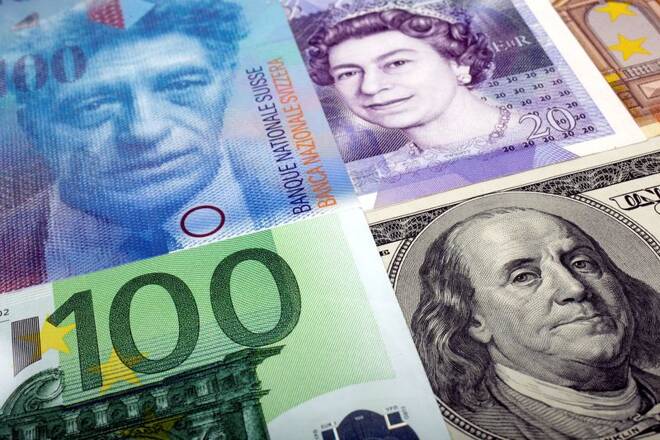Advertisement
Advertisement
FX swap debt a $80 trillion ‘blind spot’ BIS says
By:
By Marc Jones LONDON (Reuters) - The Bank for International Settlements (BIS) has warned that pension funds and other 'non-bank' financial firms now have more than $80 trillion of hidden, off-balance sheet dollar debt in the form of FX swaps.
By Marc Jones
LONDON (Reuters) – Pension funds and other ‘non-bank’ financial firms have more than $80 trillion of hidden, off-balance sheet dollar debt in FX swaps, the Bank for International Settlements (BIS) said.
The BIS, dubbed the central bank to the world’s central banks, also said in its latest quarterly report that 2022’s market upheaval had largely been navigated without major issues.
Having repeatedly urged central banks to act forcefully to dampen inflation, it struck a more measured tone and picked over crypto market troubles and September’s UK bond market turmoil.
Its main warning concerned what it described as the FX swap debt “blind spot” that risked leaving policymakers in a “fog”.
FX swap markets, where for example a Dutch pension fund or Japanese insurer borrows dollars and lends euro or yen before later repaying them, have a history of problems.
They saw funding squeezes during both the global financial crisis and again in March 2020 when the COVID-19 pandemic wrought havoc that required central banks such as the U.S. Federal Reserve to intervene with dollar swap lines.
The $80 trillion-plus “hidden” debt estimate exceeds the stocks of dollar Treasury bills, repo and commercial paper combined, the BIS said. It has grown from just over $55 trillion a decade ago, while the churn of FX swap deals was almost $5 trillion a day in April, two thirds of daily global FX turnover.
For both non-U.S. banks and non-U.S. ‘non-banks’ such as pension funds, dollar obligations from FX swaps are now double their on-balance sheet dollar debt, it estimated.
“The missing dollar debt from FX swaps/forwards and currency swaps is huge,” the Switzerland-based institution said, adding the lack of direct information about the scale and location of the problems was the key issue.
Closer
The report also assessed broader recent market developments.
BIS officials have been loudly calling for forceful interest rate hikes from central banks as inflation has taken hold, but this time it struck a more measured tone.
Asked whether the end of the tightening cycle may be looming next year, the head of the BIS’ Monetary and Economic Department Claudio Borio said it would depend on how circumstances evolve, noting also the complexities of high debt levels and uncertainty about how sensitive borrowers now are to rising rates.
The crisis that erupted in UK gilt markets in September also underscored that central banks could be forced to step in and intervene – in the UK’s case by buying bonds even at a time when it was raising interest rates to curb inflation.
“The simple answer is one is closer than one was at the beginning, but we don’t know how far central banks will have to go,” Borio said about interest rates.
“The enemy is an old enemy and is known,” he added, referring to inflation. “But it’s a long time since we have been fighting this battle”.
DINO-MITE
The report also focused on findings from the recent BIS global FX market survey, which estimated that $2.2 trillion worth of currency trades are at risk of failing to settle on any given day due to issues between counterparties, potentially undermining financial stability.
The amount at risk represents about one third of total deliverable FX turnover and is up from $1.9 trillion from three years earlier when the last FX survey was carried out.
FX trading also continues to shift away from multilateral trading platforms towards “less visible” venues hindering policymakers “from appropriately monitoring FX markets,” it said.
The bank’s Head of Research and Economic Adviser Hyun Song Shin, meanwhile, described recent crypto market problems such as the collapse of the FTX exchange and stable coins TerraUSD and Luna as having similar characteristics to banking crashes.
He described many of the crypto coins sold as “DINO – decentralised in name only” and that most of their related activities took place through traditional intermediaries.
“This is people taking in deposits essentially in unregulated banks,” Shin said, adding it was largely about the unravelling of large leverage and maturity mismatches, just like during the financial crash more than a decade ago. (This story has been refiled to name BIS in the headline)
(Reporting by Marc Jones; Editing by Toby Chopra and Alexander Smith)
About the Author
Reuterscontributor
Reuters, the news and media division of Thomson Reuters, is the world’s largest international multimedia news provider reaching more than one billion people every day. Reuters provides trusted business, financial, national, and international news to professionals via Thomson Reuters desktops, the world's media organizations, and directly to consumers at Reuters.com and via Reuters TV. Learn more about Thomson Reuters products:
Advertisement
